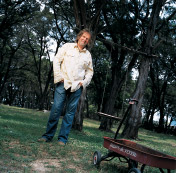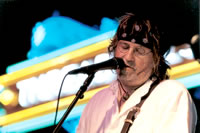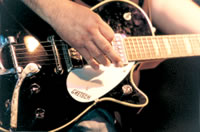 |
|||||||||||||||||

The Gift |
Just south of Austin, roads dance from hill to hill. Hot breezes float off highways. Limestone pierces dirt. There’s a rhythm here among earth, sky and humans. To travel this road is to go deep in the heart of Texas. 
The day I take the road, I’m on a quest to find singer/songwriter Ray Wylie Hubbard, elder statesman of Americana music. For those of you who don’t know about this music, think blues, country and gospel. Think tradition, storytelling and passion. Hubbard greets me on the porch of his rustic house with a hand the size of Texas. As we enter his home of stone and wood, two words come to mind: simple and spiritual. A bright yellow book, The Gift, catches my eye. I lift it toward Hubbard. “It’s one of my favorites,” he says, flipping through the pages. “Read this.” A poet is someone who can pour light into a cup then raise it to nourish your beautiful parched holy mouth. Many might find it hard to believe that the man who wrote “Up Against the Wall Redneck Mother” 34 years ago is a poet, but believe me it’s true. As Hubbard sits in front of a cross-covered stucco wall, Buddhist charms hanging from his neck, he’s the picture of peace. Life for Hubbard wasn’t always so serene. A war changed his plans. Drafting a song In the 1960s, with his studies at North Texas nearly complete and the threat of being drafted into the Vietnam War looming, Hubbard left Texas for New Mexico to seek solace in music. It was during this trying time he wrote his best-known song, “Up Against the Wall Redneck Mother.” A “hippie saloon” called Alpine Bar and a “redneck saloon” called D Bar set the stage for what Hubbard refers to as the culture clash that gave birth to the song. “I appreciate satire and irony, and I had an idea to use Dante’s Divine Comedy to frame a statement about these two opposing cultures,” he says. One night, as Hubbard walked into D Bar and removed his cap to reveal his shoulder-length hair, he says the jukebox music suddenly stopped. “A rough right-wing mountain woman eyed me,” he says. “Potential for a fight was fertile.” Today, Hubbard tells a tale about the skirmish that inspired the lyrics for his hit. The song, made famous by Jerry Jeff Walker, elevated Hubbard to cult status among progressive country music fans. “You should only write a song if you plan to sing it for 34 years,” he says, smiling. After “Redneck Mother,” Hubbard became known as one of the cosmic cowboys of Texas music, associating with the likes of Walker, Willie Nelson and Waylon Jennings. Fade out Although Hubbard had found his place in the constellation of Texas musicians, his star eventually began to fade. 
He and his band, the Cowboy Twinkies, had signed with Warner Brothers out of Nashville, but the contract prevented them from recording the kind of music they wanted to. “The album didn’t reflect what we were all about, so we couldn’t support it with a tour. It was heartbreaking after all the hard work,” He winces, shifts positions and says, “And that’s just what I did.” From 1975 to 1987, he performed in dance halls and on cruise ships, while his friends produced numerous hit records. Longing for such recognition, fame and exposure, he began to console himself with alcohol and drugs. “We partied, drank and peed,” he says. “I felt like I was spinning my wheels. I didn’t realize I was abusing drugs or doing too much alcohol. It’s funny how I reasoned things out. I couldn’t drink safely, so I thought cocaine was the answer to my drinking problem.” Hubbard hit bottom when his parents died and his marriage failed. When he realized he couldn’t overcome his grief with drugs and alcohol, he turned to another musician for help. “I heard Stevie Ray Vaughan had gotten sober, so I contacted him,” says Hubbard. “Stevie Ray took time to talk with me about overcoming addictions. “He said to me, ‘There ain’t no elevators. You gotta take the steps.’ “So I listened to him and changed enough to recover in mind and body,” Hubbard says. “Once I got sober, I had a spiritual awakening. It was like taking the boxing gloves off my hands and cotton out of my ears. I could play guitar better than ever and my songwriting exploded.” Rewind In his new-found sobriety Hubbard took stock of himself, flashing back to his childhood. From a farm in Oklahoma where he was happy with “a dog and a BB gun,” his family moved to Dallas in 1954. He says his love of books began then. “I spent a lot of time in libraries, reading fiction, American history and Greek mythology,” he says. “I liked learning about the transformation of myth through time.” After graduating from high school in 1965, Hubbard began college as an engineering major. He soon transferred to North Texas to study English. “My friend, Wayne Kidd, convinced me North Texas was the school for me, and he was right.” Hubbard says he thrived in his English courses and enjoyed writing for the school newspaper, but he never forgot his love of music. “I was 12 when I got my first guitar and learned how to play ‘Hang Down Your Head, Tom Dooley’ and ‘Peter Gunn,’” he says. “Bob Dylan, Woody Guthrie and the Beatles were my heroes. “I started noticing the names of the songwriters for Peter, Paul and Mary,” he says. “Their music was new. I liked their image Fine tuning 
After emerging from the fog of drugs and alcohol, Hubbard asked himself what he had to do to be a real songwriter. His answer was to sharpen his craft. So, at age 43, he took finger-picking lessons from guitar teacher Sam Swank. Following his heart’s desire, Hubbard went back to his musical roots as a songwriter, leading to one of the most successful comebacks in Texas music in the last decade, according to critics. Today, Hubbard performs in cathedrals as well as clubs, and he’s happily married to his second wife Judy, who manages their business, Misery Loves Co. Their 12-year-old son, Lucas, is following in his father’s footsteps, taking guitar lessons and occasionally performing with Hubbard on stage. Besides teaching his son the craft, Hubbard hopes to follow in Vaughan’s footsteps as an example of perseverance. “I’m runnin’ with the young dogs and teaching them some old tricks,” he says with a chuckle. “I’m touring, and my best record’s in the making.”
Hubbard is the same person on stage as he is on the front porch of his house. Before a performance at Threadgill’s in Austin, I have Under the blue and red neon sign, his face lights up as he tells me his plans for the future. He turns to talk with one of his roadies and turns back to me with a copy of The Gift, the book I first saw in his home. “Here,” he says, smiling. “Hope this inspires your writing like it inspired mine.” Hubbard walks toward the stage and straps on his guitar. The poetry begins.
|
||||